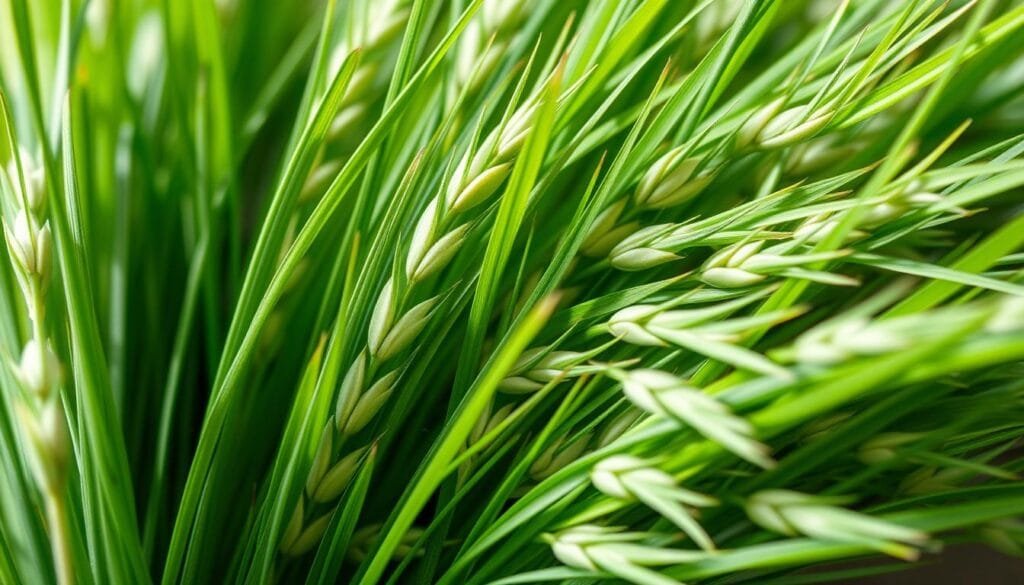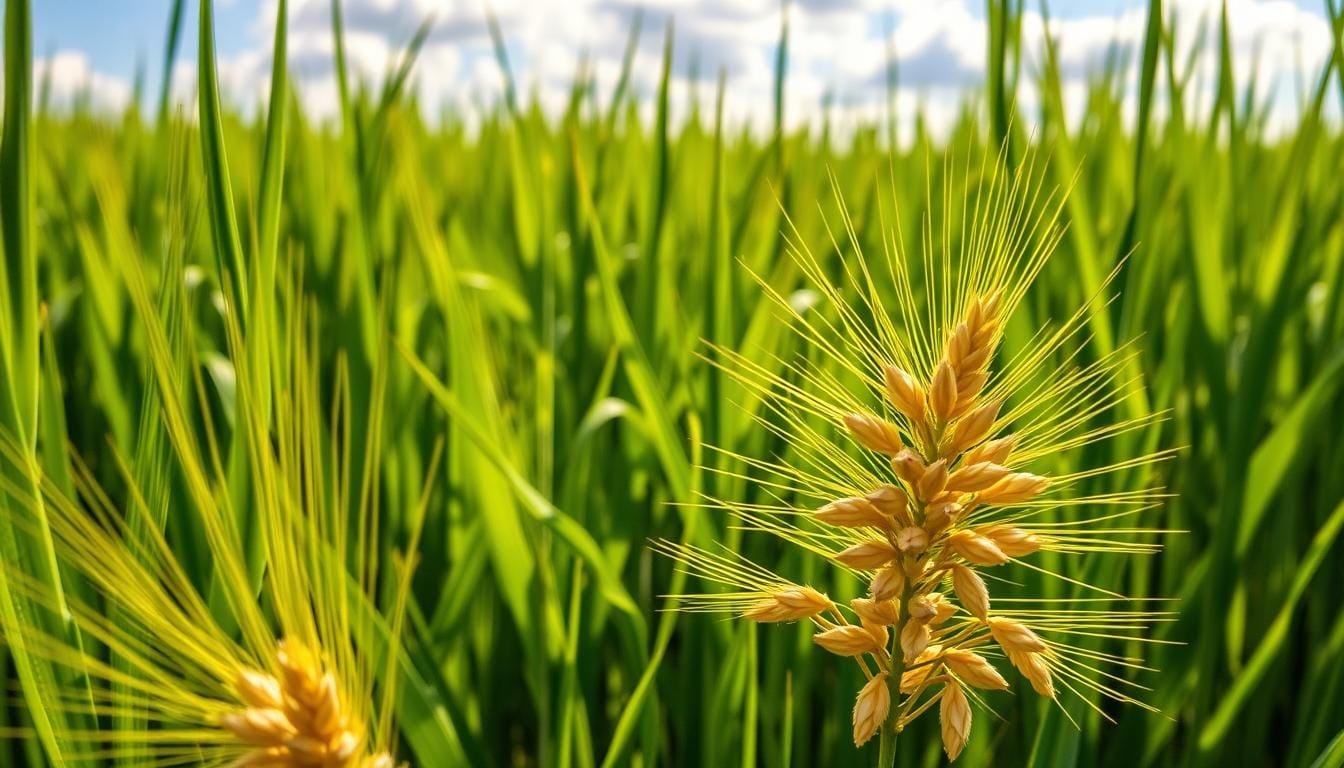Currently Empty: RM0.00
Did you know that barley grass contains 40 times more calcium than cow’s milk? This nutrient-packed superfood has gained popularity in Malaysia as a natural way to boost health. Many people add it to juices or take it as a supplement for its rich vitamin content.
Wellness Concept, a trusted nutrition expert in Malaysia, helps clients understand both the advantages and precautions of using barley products. Their team offers personalized advice during business hours: Mon-Fri 9:30am-6:30pm, Sat-Sun 10am-5pm at +60123822655.
This article explores the complete picture of barley grass – from its impressive nutritional profile with vitamins A, C, and K to potential digestive concerns. Readers will learn how it may support heart health and blood sugar levels while discovering when professional guidance becomes essential.
Key Takeaways
- Barley grass offers high concentrations of essential vitamins and minerals
- Professional consultation helps maximize benefits while minimizing risks
- The supplement may positively impact heart health and blood sugar regulation
- Some individuals might experience digestive sensitivity
- Quality matters – trusted sources like Wellness Concept provide reliable products
What Is Barley Green?
Barley grass, the young leaves of the barley plant, has been a staple in traditional wellness practices for centuries. Unlike the grain, which is harvested later, barley grass is collected during the early growth stage when it is rich in nutrients. This superfood has gained popularity in modern times, especially in Malaysia, where it is often added to juices and smoothies.
Historically, barley grass was used in traditional medicine for its healing properties. Today, it is celebrated for its high concentration of vitamins, minerals, and antioxidants. It is available in various forms, including powders, tablets, and fresh juice blends, making it easy to incorporate into daily routines.
One of the key advantages of barley grass is its gluten-free nature. However, individuals with celiac disease should exercise caution due to potential cross-contamination during processing. Compared to other supergreens like wheatgrass, barley grass stands out for its higher dietary fiber content, which supports digestive health.
| Form | Benefits |
|---|---|
| Powder | Easy to mix into drinks, commonly used in Malaysia |
| Tablets | Convenient for on-the-go consumption |
| Fresh Juice | Retains maximum nutrients, ideal for juicing enthusiasts |
For those interested in exploring the benefits of barley grass, trusted sources like barley grass benefits provide reliable information. Whether you choose it for its nutritional value or its role in supporting overall wellness, barley grass is a versatile addition to any diet.
Nutritional Benefits of Barley Green
Rich in vitamins, fiber, and antioxidants, barley grass is a natural health booster. This superfood offers a unique blend of nutrients that support overall wellness. Whether you’re looking to improve digestion or boost immunity, barley grass has something to offer.

Rich in Vitamins and Minerals
Barley grass is packed with essential vitamins like A, C, and K. Vitamin A supports immune health, while vitamin C promotes skin vitality. Vitamin K plays a crucial role in bone health and blood clotting. Additionally, it contains minerals such as calcium, iron, and potassium, which are vital for maintaining bodily functions.
High Fiber Content
With 3 grams of fiber in just 10 grams of dried barley grass, it’s an excellent source of dietary fiber. It contains both soluble and insoluble types, which aid digestion and support gut health. In Malaysia, where the average daily fiber intake is 20 grams, barley grass can help bridge the gap to the recommended 25 grams.
Antioxidant Properties
Barley grass is rich in antioxidants like saponarin and GABA, which help reduce inflammation. A 2020 study highlighted the bioavailability of flavonoids in barley grass, making it a potent choice for combating oxidative stress. Chlorophyll, another key component, aids in detoxification and blood cleansing.
| Nutrient | Benefit |
|---|---|
| Vitamin A | Supports immune health |
| Vitamin C | Promotes skin vitality |
| Vitamin K | Enhances bone and blood health |
| Fiber | Aids digestion and gut health |
| Antioxidants | Reduces inflammation and oxidative stress |
“Barley grass is a nutrient powerhouse, offering a unique combination of vitamins, minerals, and antioxidants that support overall health.”
Compared to common Malaysian greens like kangkung, barley grass stands out for its higher nutrient density. Its versatility and health benefits make it a valuable addition to any diet.
Potential Health Benefits
Barley grass has been linked to several health benefits, making it a popular choice for wellness enthusiasts. From supporting heart health to aiding blood sugar control, this superfood offers a range of advantages. However, it’s important to understand these benefits in context and consult a professional for personalized advice.
Supports Heart Health
Barley grass may help reduce the risk of heart disease. A 2004 study on hamsters showed that beta-glucan, a compound found in barley, can lower cholesterol levels. Additionally, a study involving diabetics found that 15 grams of barley leaf extract reduced LDL oxidation, a key factor in heart health.
While these findings are promising, it’s essential to note that older studies may not reflect current health standards. Barley grass should complement, not replace, prescribed treatments for heart conditions.
May Aid Blood Sugar Control
For those managing diabetes, barley grass could be a helpful addition. Its insoluble fiber slows glucose absorption, which may stabilize blood sugar levels. However, a 2014 meta-analysis revealed mixed results in human trials, suggesting that individual responses may vary.
In Malaysia, where 1 in 5 adults has diabetes, understanding the role of barley grass in blood sugar management is particularly relevant. Always consult a healthcare provider before making dietary changes.
Boosts Immune Function
Barley grass is rich in vitamin C, which plays a vital role in immune function. This nutrient supports the production of leukocytes, the body’s first line of defense against infections. A 2019 rat study also highlighted its potential to enhance gut-mediated immunity.
For those looking to strengthen their immune system, barley grass offers a natural option. However, it’s not a substitute for medical treatments or vaccines.
“Barley grass provides a unique combination of nutrients that can support heart health, blood sugar control, and immune function.”
While the benefits of barley grass are impressive, individual results may vary. For tailored advice, consider reaching out to trusted sources like Wellness Concept or consulting a healthcare professional.
Barley Green Side Effects and Risks
While barley grass is celebrated for its health benefits, it’s essential to be aware of potential side effects and risks. Understanding these can help users make informed decisions and avoid complications. Below are some key concerns to consider before incorporating this supplement into your routine.

Digestive Issues
Some individuals may experience stomach discomfort when consuming barley grass. This can include bloating, cramps, or diarrhea, especially if the fiber intake increases suddenly. To minimize these effects, start with a small dose, such as 1 teaspoon per day, and gradually increase it.
High doses of chlorophyll, a component of barley grass, can also lead to digestive upset. Those with sensitive stomachs should monitor their intake and adjust as needed.
Allergic Reactions
Allergic reactions to barley grass are rare but possible. Symptoms may include hives, wheezing, or swelling. Individuals with a history of allergies to barley pollen or related grains should exercise caution.
A 1999 case of beer anaphylaxis highlights the potential for cross-reactivity. Similarly, a 2008 Saudi study on Calotropis procera allergy underscores the importance of being vigilant about plant-based allergies.
Interactions with Medications
Barley grass can interact with certain medications, posing potential risks. For example, its high vitamin K content may interfere with blood thinners like warfarin, reducing their effectiveness.
Diabetics on insulin should also be cautious, as barley grass may lower blood sugar levels, leading to hypoglycemia. Additionally, individuals with kidney issues should monitor their potassium intake, as supplements can increase potassium levels.
“Understanding the potential side effects and risks of barley grass is crucial for safe and effective use.”
- Digestive: Start with small doses to avoid bloating or cramps.
- Allergies: Watch for symptoms like hives or wheezing, especially if allergic to barley pollen.
- Medications: Consult a doctor if taking blood thinners or insulin.
- Kidney Health: Monitor potassium levels if using supplements.
While barley grass offers numerous benefits, it’s important to use it responsibly. Always consult a healthcare professional before starting any new supplement, especially if you have existing health conditions or take medications.
How to Use Barley Green Safely
Incorporating barley grass into your daily routine can be simple and effective when done correctly. Whether you’re adding it to your diet as a powder or tablet, understanding the right amount and quality is key to maximizing its benefits.
Recommended Dosage
For most adults, a daily dose of 1-2 teaspoons of barley grass powder is sufficient. Studies, such as a 2003 trial on ulcerative colitis, suggest a maximum of 15 grams per day. Adjust the amount based on age, health status, and individual tolerance.
Start with a smaller dose and gradually increase it to avoid digestive discomfort. Mixing the powder with water, smoothies, or juices can make it easier to consume.
Choosing Quality Supplements
Not all products are created equal. In Malaysia, some supplements may contain fillers or lack proper certification. Look for NSF or BPOM-certified brands to ensure purity and safety.
Always verify gluten-free claims through batch testing, especially if you have celiac disease or gluten sensitivity. High-quality products will provide transparency about their sourcing and manufacturing processes.
Consulting a Professional
Before starting any new supplement, it’s wise to consult a healthcare professional. Wellness Concept offers expert guidance through their pharmacists, available during business hours: Mon-Fri 9:30am-6:30pm, Sat-Sun 10am-5pm. Reach them at +60123822655 for personalized advice.
Their Wellness Concept services are particularly helpful for working adults, with weekend availability for consultations.
| Form | Usage Tips |
|---|---|
| Powder | Mix with water, smoothies, or juices |
| Tablets | Take with meals for better absorption |
| Fresh Juice | Consume immediately to retain nutrients |
“Using barley grass safely starts with the right dosage, quality products, and professional guidance.”
For a quick and nutritious addition to your diet, try blending 1 teaspoon of barley grass powder with a banana, blueberries, and milk (or Malaysian santan for a local twist). This simple recipe is a delicious way to enjoy its benefits.
Conclusion
Exploring the balance of benefits and precautions is key when considering barley grass for your health. While it offers valuable nutrients like fiber and antioxidants, it’s not without potential effects. Moderation is essential, especially for those with chronic conditions.
For personalized advice, Wellness Concept is here to help. Their team is available Mon-Fri 9:30am-6:30pm and Sat-Sun 10am-5pm. Reach them at +60123822655 or via WhatsApp for convenient consultations.
Ongoing research, particularly in Asian populations, continues to uncover new insights about barley grass. In the meantime, why not try their blueberry-barley smoothie recipe? Share your experience and enjoy the journey to better health!
FAQ
What is barley green?
It’s a nutrient-rich supplement made from young barley grass, packed with vitamins, minerals, and antioxidants. Often consumed as a powder or juice, it supports overall wellness.
Are there any digestive issues linked to barley green?
Some people may experience bloating or upset stomach due to its high fiber content. Starting with small doses can help the body adjust.
Can barley green help with blood sugar levels?
Early research suggests it may aid in balancing glucose, but it shouldn’t replace medical treatment for diabetes. Always consult a doctor before use.
Does barley green interact with medications?
It might affect blood thinners or diabetes drugs. Those on prescriptions should check with a healthcare provider before adding it to their routine.
How much barley green should one take daily?
Most supplements recommend 1–2 teaspoons mixed in water or juice. Following label instructions or a professional’s advice ensures safe consumption.
Are there allergy risks with barley green?
Those allergic to gluten or grasses should avoid it, as cross-reactivity is possible. Symptoms like itching or swelling require immediate discontinuation.
What should I look for in a quality barley green supplement?
Opt for organic, non-GMO products tested for heavy metals. Powders with minimal additives offer the purest form for maximum benefits.


